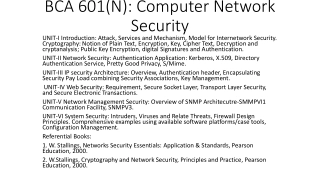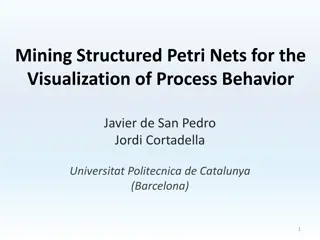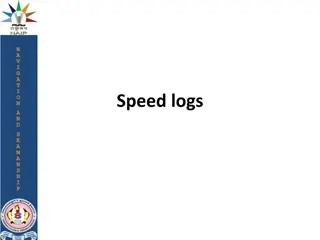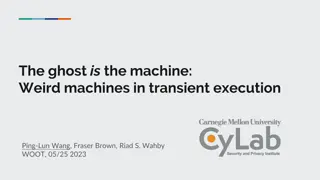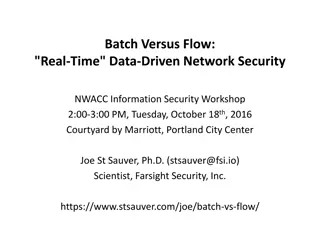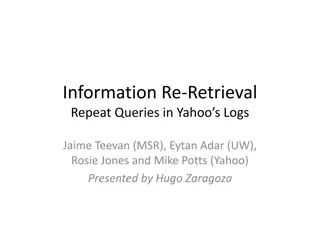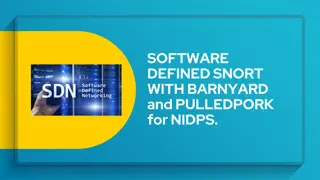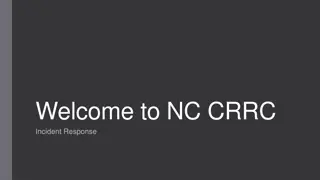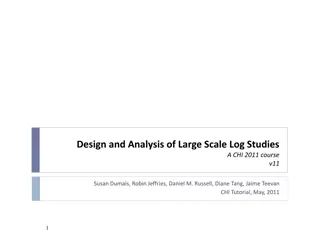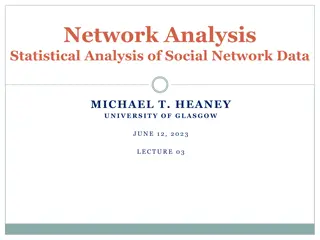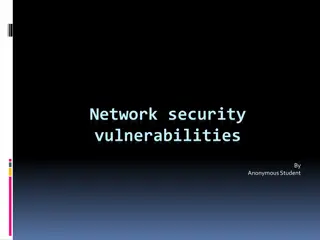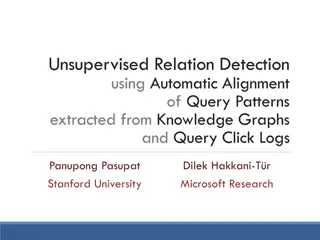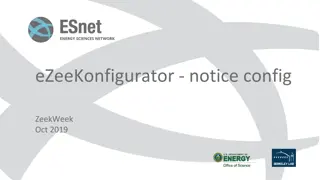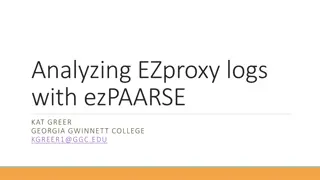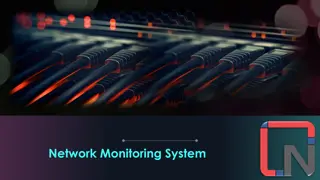Understanding Weird Logs in Zeek for Network Security Analysis
Dive deep into the world of "Weird" logs in Zeek with Fatema Bannat Wala, a Security Engineer from the University of Delaware. Discover the motivation behind analyzing over 200 types of Weirds triggered in network traffic, explore common types of Weirds, and learn how these logs can reveal crucial information for network security engineers. Unravel the unusual and exceptional activities detected by Zeek, shedding light on potential security threats and anomalies.
Download Presentation

Please find below an Image/Link to download the presentation.
The content on the website is provided AS IS for your information and personal use only. It may not be sold, licensed, or shared on other websites without obtaining consent from the author. Download presentation by click this link. If you encounter any issues during the download, it is possible that the publisher has removed the file from their server.
E N D
Presentation Transcript
Is Weird really weird? Fatema Bannat Wala Security Engineer University of Delaware
About Me A big fan of Zeek IDS Have been working with Zeek for past 3.5 years Joined UD s SecOps team in 2015 Passionate about Cyber-Security Also a part-time Ph.D. student
Roadmap of todays talk What is Weird in Zeek? Motivation Types of Weirds in Zeek? Where to find Weirds? Deep dive into top most triggered Weirds Summary University s Weird Profile
UDs Traffic Profile 10 Gbps network links Average ~5 Gbps network traffic per link Peak ~8 Gbps per link 4 Zeek sensors, each getting 25% of total traffic Each sensor getting ~300,000 pps Overall triggered Weird notices logged in weird.log were ~21 M/day
What is Weird in Zeek? Google-land - suggesting something supernatural; uncanny. Zeek-land unusual or exceptional activity that can indicate malformed connections, traffic that doesn t conform to a particular protocol, malfunctioning or misconfigured hardware, or even an attacker attempting to avoid/confuse a sensor.
Motivation. Curiosity to know why so many (>200) types of different Weirds getting triggered for the network traffic, whether they are serious events to be looked at, malformed packets or malformed application?? Analyzing the Weird logs might reveal information about some activity that is hard to notice in the day to day life of network/security engineer.
Types of Weird There are MANY types of Weird defined in Zeek. More than 200 are triggered on our network traffic. Most common ones are: DNS_RR_unknown_type Dns_unmatched_msg Dns_unmatched_reply fragment_with_DF bad_ICMP_checksum DNS_Conn_count_too_large possible_split_routing inappropriate_FIN TCP_Christmas truncated_header data_after_reset data_before_established SYN_seq_jump SYN_with_data TCP_ack_underflow_or_misorder DNS_truncated_RR_rdlength_lt_len line_terminated_with_single_CR DNS_RR_length_mismatch
Where to find Weirds? Definition: Weird notices are mainly defined in following locations: In source code of Zeek IDS (in .cc files) In script land , in base/ policy/ folders (in various .bro scripts) Logging: The Weird notices are logged into a separate log file called weird.log . The logging of different Weirds is be controlled by base/frameworks/notice/weird.bro
Where to find Weirds? Definition ex: Core Layer- DNS.cc, Script Land ssl/main.bro
Where to find Weirds? Logging : Script - weird.bro, Log file - weird.log base/frameworks/notice/weird.bro ## A table specifying default/recommended actions per weird type. const actions: table[string] of Action = { ["DNS_RR_bad_length"] = ACTION_LOG, ["DNS_RR_length_mismatch"] = ACTION_LOG, ["DNS_RR_unknown_type"] = ACTION_LOG, ["FIN_after_reset"] = ACTION_IGNORE, ["non_IPv4_packet"] = ACTION_LOG_ONCE, } &default=ACTION_LOG &redef;
Analysis of top most triggered Weirds In the University s network the following were the top most triggered Weirds in weird.log over 24 hrs period: $ zcat weird.*.log.gz | awk -F'\t' '{print $7}' | sort | uniq -c | sort -rn 2,603,914 DNS_RR_unknown_type 2,160,812 possible_split_routing 2,092,811 inappropriate_FIN 753,398 fragment_with_DF 18,343 bad_ICMP_checksum
DNS_RR_unknown_type Defined: In src/analyzer/protocol/dns/dns.cc Cause: The RR type currently not parsed in Bro Types seen in the traffic: Top most RR types recorded in weird.log 1,049,729 DNS_RR_unknown_type 46 234,393 DNS_RR_unknown_type 50 99,914 DNS_RR_unknown_type 43 44,346 DNS_RR_unknown_type 47 26,592 DNS_RR_unknown_type 48
DNS_RR_unknown_type After looking up those RR numbers, looks like they belong to DNSSEC protocol types:
DNS_RR_unknown_type Reason: The DNS servers support DNSSEC and receive good amount of traffic for DNSSEC requests and responses. Remediation: Ignore those alerts and move on, or write DNSSEC RR types parsing support in Zeek*. We chose the later Result: Compiled the code with DNSSEC RR types parsing support and aha - no more alerts for those 5 RRs, the alert count for DNS_RR_unknown_type reduced from ~2 M to ~5 K per day. *The code with DNSSEC support in Zeek can be found at: https://github.com/zeek/zeek/tree/master or https://github.com/fatemabw/bro/tree/master (bro2.5.4 with DNSSEC)
possible_split_routing Defined: In src/analyzer/protocol/tcp/TCP.cc Cause: When Zeek doesn t see the other side of the connection, signifying possible split routing Seen in the traffic: Top most destination hosts recorded in weird.log 1,515,526 128.xx.xx.xx 80 possible_split_routing 5,640 128.yy.yy.yy 443 possible_split_routing 121 5.185.16.24 443 possible_split_routing
possible_split_routing Reason: Router ACLs filtering one side of the connection, i.e. the requests from the internet to the server, so not to overwhelm the traffic from mirrored interface. Remediation: Router ACLs now filtering both sides of the connection to reduce noisy flows. Don t confuse your IDS Result: Not seeing the possible_split_routing anymore for that server, just couple of those alerts every now and then for other IPs.
inappropriate_FIN Defined: In src/analyzer/protocol/tcp/TCP.cc Cause: When Zeek sees a packet with a FIN set during a connection not complying with TCP/IP standard. Seen in the traffic: Top most destination hosts recorded in weird.log. 1,410,450 128.xx.xx.xx 80 inappropriate_FIN 4,840 128.yy.yy.yy 443 inappropriate_FIN 121 5.185.16.24 443 inappropriate_FIN
inappropriate_FIN Reason: Because of Router filtering one side of traffic, Zeek would see the Fin sent by the server as inappropriate, as it couldn t see the other side of traffic (was a consequence of possible_split_routing ). Remediation: Router ACLs now filtering both sides of the connection to reduce noisy flows. Result: Not seeing the inappropriate_FIN anymore for that server, just couple of those alerts every now and then for other IPs
fragment_with_DF Defined: In src/Frag.cc Cause: When a fragmented packet is encountered with DF flag set (Don t Fragment). Seen in the traffic: Top most Src hosts recorded in weird.log, the top most IPs belong to the DNS servers! 336,240 128.xxx.xxx.xx fragment_with_DF 335,411 128.yyy.yyy.yy fragment_with_DF 172 130.114.200.6 fragment_with_DF
fragment_with_DF Reason: Because of EDNS0 (Extensible DNS v0)! DNS approach to a reasonable compromise - the management of the packet MTU is passed into the application layer. The application will conventionally operate with a maximum UDP payload size (which is 4096B in BIND 9+ by default) It was happening because of the lower MTU (1500) of the local interface of DNS servers. But as the servers support EDNS0 and DNSSEC, the responses are bound to be greater than local interface MTU.
fragment_with_DF Remediation: could try to increase the MTU of the local interfaces of DNS servers to be 4096 bytes, so that the fragmentation doesn t happen on the local interface. could try to tweak maximum UDP payload size in the BIND settings, which is by default 4096, to 1472 bytes to match the MTU of the local interface to avoid fragmentation. (We chose this one)
fragment_with_DF Remediation continued BIND 9 configuration attribute: max-udp-size Sets the maximum EDNS UDP message size named will send in bytes. Valid values are 512 to 4096. The default value is 4096. This value applies to responses sent by a server. The usual reason for setting max-udp-size to a non-default value is to get UDP answers to pass through broken firewalls that block fragmented packets and/or block UDP packets that are greater than 512 bytes. Setting this to a low value will encourage additional TCP traffic to the nameserver.
fragment_with_DF Result: No more "fragment_with_DF" notices in the weird logs for the DNS servers! and the alert counts was reduced dramatically from ~700K to couple of 100s for a day!!
Few other weirds .. Following Weirds signify potentially bad traffic bad_ICMP_checksum (src/analyzer/protocol/icmp/ICMP.cc) TCP_Christmas (src/analyzer/protocol/tcp/TCP.cc) Reason: bad_ICMP_checksum / TCP_Christmas Weird notices were seen to be triggered by the scanner IPs, sweeping the range of IPs on the network. Remediation: Blocked the src IPs at the border. For bad_ICMP_checksum, we have a threshold of more than 10 bad checksum requests per host.
Summary of Weirds Weird Type Improvement in Network DNS_RR_unknown_type Implemented DNSSEC RR parsing possible_split_routing Fixed Router ACL filter inappropriate_FIN Fixed Router ACL filter fragment_with_DF Fixed the BIND configuration bad_ICMP_checksum/TCP_Christmas Blocked the Bad IPs DNS_unmatched_msg/reply (~11M/day) Not logging , doesn t provide much insights *By above improvements we got rid of ~18M/day Weird notices overall from weird.log file (85% reduction)
Universitys Profile #Before count y Weird 2,603,914 0 DNS_RR_unknown_type 753,398 1 fragment_with_DF 164,344 2 bad_TCP_checksum 13,480 3 DNS_RR_length_mismatch 14,214 373 13,474 9,502 27,133 26,255 7,342 2 4 DNS_truncated_RR_rdlength_lt_len 5 premature_connection_reuse 6 connection_originator_SYN_ack 7 data_after_reset 8 empty_http_request 9 truncated_header 10 Teredo_bubble_with_payload 88 HTTP_content_range_unknown 2 1 1 1 89 smtp_unmatched_end_of_data 90 bad_IP_checksum_in_tunnel 91 bad_TCP_header_len 92 fragment_size_inconsistency Total plotted notices: 3,847,532
Universitys Profile #After count 4,048 4,433 141,307 2 99,757 52,007 41743 2,584 24,120 25,876 11,749 52,388 1 1 2 1 6 Total plotted notices: 752,977 y 0 1 Weird unknown_SIP_method inflate_failed data_after_reset 3 4 5 6 7 8 9 10 SYN_with_data 93 unexpected_multiple_HTTP_reqs 94 UDP_datagram_length_mismatch 95 ssh_unknown_kex_algorithm 96 unknown_protocol_7 97 TCP_christmas bad_TCP_checksum SYN_seq_jump DNS_Conn_count_too_large above_hole_data_without_any_acks DNS_RR_length_mismatch DNS_truncated_RR_rdlength_lt_len data_before_established
Acknowledgements Thanks to the EDUCAUSE Team for the support, and for the opportunity to be a presenter at SPC 19! Thanks everyone for your time and interest!
Session Evaluations There are two ways to access the session and presenter evaluations: 1 In the online agenda, click on the Evaluate Session link 2 From the mobile app, click on the session you want from the schedule > then click the associated resources > and the evaluation will pop up in the list


